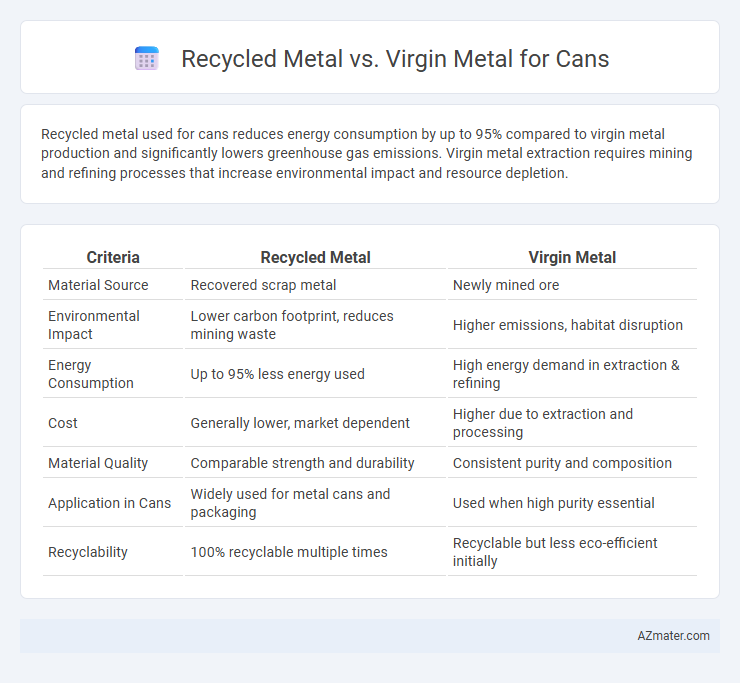Recycled metal used for cans reduces energy consumption by up to 95% compared to virgin metal production and significantly lowers greenhouse gas emissions. Virgin metal extraction requires mining and refining processes that increase environmental impact and resource depletion.
Table of Comparison
| Criteria | Recycled Metal | Virgin Metal |
|---|---|---|
| Material Source | Recovered scrap metal | Newly mined ore |
| Environmental Impact | Lower carbon footprint, reduces mining waste | Higher emissions, habitat disruption |
| Energy Consumption | Up to 95% less energy used | High energy demand in extraction & refining |
| Cost | Generally lower, market dependent | Higher due to extraction and processing |
| Material Quality | Comparable strength and durability | Consistent purity and composition |
| Application in Cans | Widely used for metal cans and packaging | Used when high purity essential |
| Recyclability | 100% recyclable multiple times | Recyclable but less eco-efficient initially |
Introduction to Metal Cans: Recycled vs Virgin Materials
Metal cans manufactured from recycled materials significantly reduce the environmental impact compared to virgin metals by conserving natural resources and lowering energy consumption during production. Virgin metal, sourced directly from mining, requires intensive extraction and processing, leading to higher carbon emissions and habitat disruption. Recycling metal cans enhances sustainability by maintaining material quality while minimizing waste and reducing the need for raw ore extraction.
Environmental Impact: Recycled Metal vs Virgin Metal
Recycled metal significantly reduces environmental impact by lowering energy consumption and greenhouse gas emissions compared to virgin metal extraction. Recycling aluminum for cans uses up to 95% less energy than producing new aluminum from bauxite ore, leading to a substantial decrease in carbon footprint. Using recycled metal in can production also minimizes mining waste and preserves natural resources, making it a more sustainable and eco-friendly choice.
Energy Consumption in Can Production
Recycled metal in can production reduces energy consumption by up to 95% compared to virgin metal extraction and processing. Manufacturing cans from recycled aluminum requires only 5% of the energy needed to produce aluminum from bauxite ore, significantly lowering carbon emissions. This energy efficiency translates into cost savings and environmental benefits, making recycled metal a sustainable choice for can production.
Greenhouse Gas Emissions Comparison
Recycled metal for cans significantly reduces greenhouse gas emissions compared to virgin metal, with studies showing up to 95% lower emissions during production. The energy-intensive processes required for mining and refining virgin metals generate substantially more CO2, contributing heavily to climate change. Utilizing recycled metals not only diminishes carbon footprints but also conserves natural resources and minimizes environmental degradation.
Resource Depletion and Sustainability
Recycled metal significantly reduces resource depletion by minimizing the extraction of virgin ore, conserving finite natural resources and lowering environmental impact. Using recycled metal for cans decreases energy consumption by up to 95% compared to producing metal from virgin materials, enhancing sustainability in manufacturing processes. The adoption of recycled metal supports circular economy principles by promoting material reuse and reducing landfill waste.
Quality and Performance: Are Recycled Cans Different?
Recycled metal used in cans retains nearly the same structural integrity and durability as virgin metal, ensuring consistent quality and performance for packaging. Advanced recycling techniques preserve the metal's strength, preventing any significant difference in the can's resistance to corrosion or deformation. Studies show recycled aluminum maintains its barrier properties and lifespan, making it a reliable alternative to virgin metal without compromising safety or functionality.
Economic Benefits of Using Recycled Metal
Recycled metal for cans significantly reduces production costs by lowering energy consumption by up to 95% compared to virgin metal extraction and processing. Utilizing recycled aluminum and steel reduces raw material expenses and decreases landfill waste, thus creating economic incentives for manufacturers. The increased demand for recycled metal also drives the growth of recycling industries, promoting job creation and local economic development.
Challenges in Recycling Metal for Cans
Recycling metal for cans presents challenges such as contamination from food residues and coatings, which complicate the melting process and reduce metal quality. Sorting mixed metals like aluminum and steel requires advanced technologies to prevent alloy degradation and maintain material purity. High energy costs and infrastructure limitations further hinder efficient recycling, impacting the cost-effectiveness and sustainability of recycled metals in can production.
Innovations in Metal Can Manufacturing
Innovations in metal can manufacturing increasingly leverage recycled metal, reducing the carbon footprint compared to virgin metal extraction and processing. Advanced alloy formulations and improved recycling techniques enhance the strength and durability of cans made from recycled metals, matching or exceeding those produced from virgin materials. These innovations support sustainability goals while maintaining the structural integrity required for beverage and food packaging.
Future Trends: Toward a Circular Economy for Cans
Recycled metal in can production significantly reduces energy consumption and carbon emissions compared to virgin metal extraction, aligning with global circular economy goals. Innovations in advanced sorting and recycling technologies are driving higher recovery rates, making recycled metals more economically viable and sustainable. Future trends emphasize closed-loop recycling systems that minimize waste and extend the lifecycle of metal cans, promoting resource efficiency and environmental stewardship.

Infographic: Recycled metal vs Virgin metal for Can
 azmater.com
azmater.com